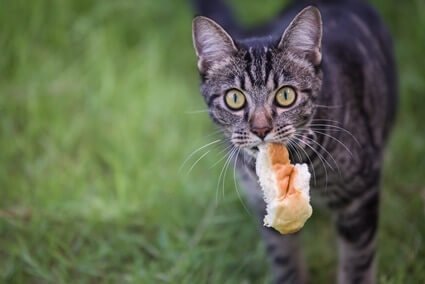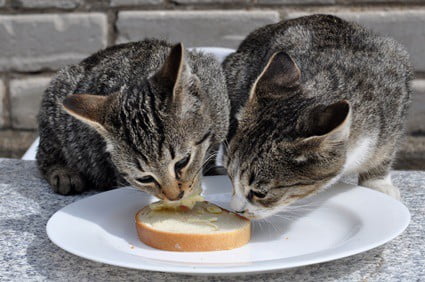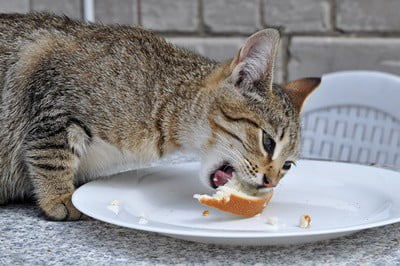Cats love bread due to its strong aroma, chewy texture, and the tangy flavor of yeast. In fact, the yeast can improve a cat’s immune system and ability to absorb other nutrients. However, cats are carnivores, and bread is made of wheat, olive oil, and sugar, among other ingredients. That can make owners worried about offering this food to their cats.
It’s safe to feed your cat some plain white bread or toast every 1-2 weeks. Over-feeding bread to a cat can lead to bloating, constipation, and weight gain. In the long-term, this can escalate into acute malnutrition and diabetes. The high amount of carbs and saturated fats in bread make it hard to digest.
It’s only dangerous to feed cats bread in large amounts or with certain added ingredients. Avoid garlic bread, sweet bread with added sugar, onion bread, raisin bread, or sourdough. Raw bread dough should be avoided, as it can lead to indigestion and immediate sickness. Pumpkin bread, plain white bread, toast, and bread and butter can be given in moderation. As long as the cat doesn’t lose its appetite for healthier cat foods, bread is fine as a treat.
Are Cats Allowed To Eat Bread?
Cats will not be harmed if they eat a slice or two of bread. None of the ingredients are toxic, nor will they cause immediate digestive issues in a cat. However, that doesn’t mean bread is healthy food to offer your feline.
According to the American Veterinary Medical Association, cats are naturally adapted to rely on proteins and fats as their main energy sources. This means that bread has no nutritional value. It’s mainly composed of carbs and fats, not protein. It doesn’t contain any meaningful calories or nutrients that your cat requires for healthy growth. If given bread regularly, cats will struggle to maintain their:
- Muscle mass
- Energy levels
- Brain and eye health
This means you should never replace your cat’s regular diet with bread. It’s only a treat.
Are Cats Allergic To Bread?
Cats are not allergic to bread. However, some types of bread can upset your cat’s stomach, causing digestive problems.
Because of that, be sure only to choose plain white bread for a cat. Bread that contains garlic, onions, raisins, chocolate, and grapes can be toxic to cats. If taken in large quantities, these recipes could harm your cat’s digestive system or even result in toxic shock.
That’s because cats will struggle to digest bread properly. The carbohydrates, starches, and plant-based ingredients aren’t a normal part of a cat’s diet.
Can Cats Eat White Bread?
Cats can eat white bread safely. It contains simple and non-toxic ingredients, such as:
- Water
- Flour
- Sugar
- Yeast
- Olive oil
None of these will cause immediate or short-term harm to your cat. The only danger is if white bread turns into a staple of your cat’s diet.
Like all kinds of bread, it will not contain any essential nutrients that cats require for healthy growth and development. Overfeeding white bread may also lead to indigestion. Your cat will struggle to process the high amount of carbohydrates and fats. That can result in:
- Bloating
- Stomach cramps
- Constipation
Can Cats Eat Bread And Butter?
Cats can be fed some bread and butter. However, your cat runs the risk of becoming obese if you give it too much bread with butter. Butter contains saturated oils and unnecessary fats that can make your cat store fat rather than burning it. Cats are also lactose intolerant, so they shouldn’t consume too much butter, milk, or dairy products.
A diet of bread and butter can also cause dental problems. When your feline consumes bread, its saliva will react with the starch found in bread and create a gloopy paste. The paste will then cling onto your cat’s teeth and lead to:
- Bacteria growth
- Excess plaque
- Decay
This is made worse with butter, as the oily substance is more likely to stick between the teeth. The sugar found in the bread can also attract bacteria and may cause periodontal disease. If this is a snack your cat prefers, be sure to clean its teeth regularly. You should also check for signs of plaque build-up and cavities from the bread.

Can Cats Eat Toast?
Cats can eat toasted bread. The cooking process does not introduce any harmful ingredients, nor does it cause a chemical reaction in the bread that’s dangerous for cats. Instead, your cat will enjoy a crunchy treat.
However, plain or buttered toast is still not a healthy meal for your cat. It does not contain any essential nutrients that cats need. Worse yet, the somewhat crusty nature of toast can lead to dental issues for young kittens or senior cats.
The abrasive texture may irritate the gums or scratch the inside of your cat’s mouth. For this reason, you should avoid giving your very young or old cat toast.
Do Cats Like Bread?
Most cats like eating bread. The aroma of bread fresh from the oven or the scent of toast freshly buttered should attract your curious cat, even if it’s never tasted it before.
While there’s no official research that explains why cats like bread, it’s likely because of the yeast. The tangy flavor and sharp smell are often irresistible for cats. Moreover, most cat food brands have yeast as an ingredient as:
- A way to improve the taste
- A nutritional supplement
It can work to balance out your cat’s digestive system, better absorb vitamins and minerals, and boost the immune system. With that in mind, cats are naturally drawn to yeast as a way to remain strong and healthy.
Even still, the health benefits of yeast don’t outweigh the downsides of bread. Even natural forms of wild yeast are found in fruits, vegetables, and herbs. Cats are not omnivorous and rarely eat food other than meat. It’s only a rare treat that cats might indulge in to balance their digestive tract or provide calories when no meat is available.
Why Is My Cat Obsessed With Eating Bread?
Your cat may be obsessed with bread due to the flavor. Yeast is used as an appetizer and helps to enhance the taste of pet food. Considering this, your feline may try to gorge itself with bread since it’s:
- Like a tasty version of its normal meals
- Warm and soft
- Fluffy and chewy
- Filling
That means you’ll need to be in charge of rationing the bread. If allowed, your cat might overeat.
Is Bread Harmful To Cats?
Bread is not bad for cats to eat, per se, in that it’s not immediately harmful. You can provide your cat with a small piece without any danger of any negative side effects.
However, you should never give it as a daily snack nor as a regular staple in the cat’s diet. Since it contains mostly plant-based ingredients, your carnivorous feline won’t be able to remain healthy, strong, and balanced on bread alone.
Added ingredients may be actively toxic to your cat, though. To be safe, it’s wise only to feed your cat plain white bread that isn’t embellished with other flavorings. Avoid store-bought kinds if possible, as these may contain preservatives. You should also watch out for allergic reactions since some cats are gluten intolerant.
Is Garlic Bread Bad For Cats?
Garlic bread is dangerous for cats. Garlic belongs to the allium plant family, which is poisonous to cats and dogs.
As an ingredient, garlic is safe for human consumption but can lead to vomiting, lethargy, and even toxic shock in your cat. That’s made worse because of thiosulphate, a potent compound found in garlic. It’s known to cause hemolytic anemia in cats when eaten in large quantities. Thiosulphate is also found in various other ingredients like:
- Onions
- Leeks
- Shallots
- Chives
These should all be avoided as well. However, garlic is 5 times more toxic than onions and the above-mentioned plants. You should never give your cat bread laced with these seemingly harmless ingredients.
Is Sourdough Bread Bad For Cats?
Sourdough bread should be avoided as it contains a dangerous amount of yeast. Your cat will go wild for the delightful taste, but this bread can harm its digestive system. The yeast will also react with the carbohydrates in sourdough and produce:
- Ethanol alcohol
- Carbon dioxide
This might cause serious problems when the ethanol finds its way into your cat’s bloodstream. Your cat could experience frequent seizures or develop chronic respiratory illnesses.
Is Pumpkin Bread Bad For Cats?
Pumpkin bread is not bad for cats. However, it has a very high fiber content that could lead to stomach upset. Giving your cat too much pumpkin bread can lead to:
- Bloating
- Diarrhea
- Stomach cramps
That’s because a cat’s digestive system is tailored for breaking down fats and proteins only. Your feline might have trouble digesting pumpkin bread if given in large quantities. The heavy plant-based ingredients will either pass whole or lead to blockages over time. In the best-case scenario, this would lead to stomach cramps and swelling.
If you decide to feed your cat pumpkin bread, or any food with pumpkin spice, then do so in moderation. Cats will glean a few vitamins and a delightful flavor from this treat but can get sick if it becomes a whole (and frequent) meal.
Can Cats Eat Raw Dough?
You shouldn’t give cats raw bread dough, even in small quantities. Dough tends to expand when exposed to warm and moist conditions. This means it will expand in your cat’s stomach and lead to:
- Serious discomfort
- Excess gas
- Bloating
Besides, the yeast will be fresh and potent in uncooked bread. This allows it to react with the carbohydrates in the raw dough and produce the aforementioned ethanol and carbon dioxide. Your cat may experience the same negative side effects as when it’s fed sourdough, only worse and at a faster pace.
How Much Bread Can A Cat Eat?
Your cat should not eat more than one slice of bread. This shouldn’t happen more than once every couple of weeks. As mentioned above, this is mostly because bread is empty calories for a cat.
A plain slice of white bread, for instance, contains about 1/5 of the calories a cat needs daily. Giving your cat more than a slice of bread every day is meaningless. It could rob your cat of the appetite it needs for healthy food.
It’s best to offer your cat a bite or two of bread once every few days, or once a week. This allows it to work as a special treat, without it becoming a staple food or a filling meal.
Do Carnivores Eat Bread?
Carnivores do not eat bread naturally since it is a plant product rather than an animal product. Instead, they survive predominantly on meat. However, some carnivorous animals, like cats, can eat vegetables, fruits, grains, and derivatives of them in small quantities.
Their digestive system is not tailored to process them in large quantities. Likewise, their body is not designed to thrive or maintain itself on plant products. However, it will not harm them outright, especially if it’s given on a limited basis.
In fact, there are times when cats will eat vegetables, grass, and fruit as a way to soothe digestive issues in the wild. It’s usually a sign that the feline is very ill if it’s willing to go that far.
With that in mind, house cats (like most pets) can be swayed by the appeal of flavor. If your cat likes the taste of bread, you don’t have to bar it from the treat outright. Make sure it never becomes the main food group, and provide your cat with a steady supply of fish, dark meat, and cat food. This will keep it in top shape, with some leeway to enjoy a few treats.
Are The Carbohydrates In Bread Bad For Cats?
According to Veterinary Sciences, high-carbohydrate diets are dangerous for cats. They can lead to chronic conditions like feline obesity and diabetes. With that in mind, it’s primarily the carbs in bread that lead to the most issues.
The empty calories will do no immediate harm, as long as your cat has other food. However, the carbohydrates may disrupt the cat’s digestive system and lead to serious conditions, weight gain only being one of many.
According to Oregon State University, cats tend to prefer high carbohydrate diets, even though it is harmful to them when consumed in large quantities. If your cat loves bread, it’ll be up to you to ration the amounts. The cat won’t know any better.
What Are The Side Effects of Bread On Cats?
Even though bread is safe for cats in moderation, it’s not hard to feed your cat too much. Maybe the cat steals a bite too many at the breakfast table. Maybe a family member offers your cat some more bread, unaware that you’ve already provided the allotted treat.
Gluten Intolerance
Some cats are allergic or sensitive to the gluten found in bread and other wheat products. Celiac disease or gluten intolerance is often accompanied by symptoms such as:
- Vomiting
- Difficulty breathing
- Weight loss
- Severe diarrhea
- Itchy skin

Obesity
A slice of bread may contain as little as 79 calories but up to 15 carbs. Worse yet, no cat that loves bread will stop at a single slice. This excess of carbs (matched to empty calories and fat that’s hard for a cat’s system to metabolize) can lead to feline obesity. This can quickly escalate into the development of diabetes.
Indigestion
The digestive system of cats is designed to break down fats and proteins found in meat. Since bread only contains saturated fats and carbohydrates, your cat might have trouble digesting it. Even in the best situation, cats digest bread very slowly, and this might interfere with their appetite.
Bloating
Gas build-up and bloating are other side effects of eating too much bread. The high fiber in bread can cause gas build-up in a cat, especially if it’s undercooked. Your cat’s stomach may also bloat due to slow digestion and constipation.
Oral Health Problems
Dental problems are common in cats that like to eat bread. When your cat eats bread, the saliva will react with starch and form a sticky paste that will cling onto the cat’s teeth. This will encourage bacterial growth in the mouth. The result may be gum disease and dental cavities since cats rarely clean their teeth.
Nutrient Deficiency
Over time, your cat may display symptoms of malnourishment, even if it’s eating plenty of bread. Despite having a full stomach, the cat will not have the vitamins, minerals, and proteins its body needs to survive. It may:
- Become lethargic
- Have weaker bones
- Develop bad eyesight
- Have dingy fur
Bread is not bad for cats. It can be a good treat, and the yeast content may even be helpful for your cat’s immune system. However, if it’s given as anything other than an occasional snack, it can have negative effects. Be sure to give plain bread sparingly, and avoid added ingredients, such as garlic.


My cat loves instant dry yeast from the packet! Every time I have opened it in the past she has started meowing like crazy, and today i gave her a few granules to sniff and she seemed to enjoy eating them. Is it safe to feed it to her even in very small quantities? I appreciate the informative article!